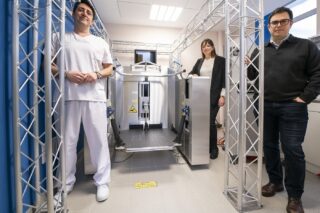A roundtable at MEDICA 2024 highlighted the current analysis of custom AI models in laboratories outperforming standardized systems. Speakers emphasized the need for data access, transparency, and staff collaboration for successful adoption.
November 12, 2024—This year’s MEDICA 2024, the world’s leading medical technology trade fair, brought together industry pioneers to explore the future of healthcare, with artificial intelligence (AI) taking center stage. Among the standout events was a roundtable titled “AI in LabMed – Current Status,” where experts from across laboratory medicine and bioinformatics offered a candid look at AI’s evolving role in diagnostics. Speakers such as Niroshan Nadarajah of the Munich Leukemia Laboratory and Professor Dr. Janne Cadamuro of University Hospital Salzburg shared insights on AI advancements, challenges, and practical applications in modern laboratories.
Custom AI Models Outperform FDA-Approved Systems
The roundtable sparked a critical discussion on the effectiveness of custom AI models versus FDA-approved, off-the-shelf solutions. Labs with the resources and expertise to develop in-house models reported better diagnostic performance and adaptability than those using standard FDA-cleared products. For instance, Nadarajah described how custom models at the Munich Leukemia Laboratory reached 86% accuracy in cytomorphology classification after refining processes based on millions of patient images, a level of success that FDA-approved models have yet to achieve in his lab.
Such tailor-made AI solutions benefit from adjustments that align closely with each lab’s unique workflows, increasing accuracy and responsiveness. By contrast, FDA-cleared models, while accessible, typically report lower accuracy rates, around 40-45%, and struggle to adapt across diverse lab environments without significant customization.


The Data Conundrum: Privacy, Access, and Integration Challenges
High-performance AI hinges on access to extensive, labeled datasets; however, privacy regulations and fragmented data systems present major hurdles. Professor Cadamuro highlighted that, despite efforts like the European Health Data Space aiming to streamline data sharing across borders, current privacy laws limit AI’s development potential. As AI relies on vast and varied data to learn effectively, these limitations restrict its ability to generalize well across different lab settings, a pressing issue when considering AI adoption at scale.
“Without structured and unified data policies, we are limiting AI’s true potential in healthcare,” Cadamuro noted, emphasizing the need for robust frameworks that respect privacy while enabling data access essential for AI refinement.
AI’s transformative potential in labs is undeniable, yet staff acceptance remains a challenge. Many lab technicians view AI as a complex tool primarily for IT specialists. To encourage adoption, experts at the roundtable suggested that staff should be introduced to AI as an “assistant” that can handle repetitive tasks, helping mitigate staff shortages without threatening their roles. Building confidence in AI as a support tool may require carefully planned training and transparent communication, focusing on AI’s role in easing workloads rather than replacing human expertise.
Transparency: The Key to Trusting AI-Driven Diagnostics
Trust in AI diagnostics hinges on transparency. The discussion underscored the importance of developing systems that clearly explain their decision-making processes. AI-driven results need to be accessible and understandable, especially for medical professionals tasked with interpreting these findings. At the Munich Leukemia Laboratory, Nadarajah’s team has heavily invested in transparency tools that allow physicians to follow the AI’s diagnostic logic—a move aimed at reinforcing trust and enabling more confident clinical decisions.
“Transparency isn’t just a ‘nice-to-have’ feature; it’s essential for AI adoption in clinical settings,” Nadarajah stated, noting that transparent decision-making in AI could pave the way for broader acceptance across the medical community.
The roundtable also highlighted AI’s success in specialized laboratory applications, like genomic sequencing, where consistent workflows boost accuracy. However, applying these specialized models to other labs remains a challenge due to the unique procedures and equipment each lab uses. This inconsistency limits the effectiveness of generalized AI solutions, reinforcing the notion that custom-built models are often necessary for reliable results in niche laboratory settings.
A Dive into AI-based Products at MEDICA
At MEDICA, several companies showcased their AI-based laboratory products. Noul, for example, presented its miLab platform which offers a fully automated diagnostic approach, combining laboratory-level precision with point-of-care accessibility. Watch a video on miLab here. It uses AI-driven digital microscopy to process up to 500 cell images per second. It supports diagnostics such as malaria detection and cancer profiling through scalable cartridges. How might similar platforms address accessibility challenges in underserved regions?
Health Cluster Portugal presented 2Ai, an initiative focused on applying AI in healthcare and industry. One example from its Applied Artificial Intelligence Laboratory unit involves the development of printable piezoresistive polymer composites for self-sensing catheters, showcasing AI’s role in optimizing material properties for medical devices. This research aims to enhance sensor performance and enable real-time health monitoring, emphasizing the potential for AI-driven advancements in laboratory testing and device development. Could such AI-supported innovations improve the customization and accessibility of medical technologies?
Fapon Biotech highlighted its advancements in AI-enabled diagnostics, including platforms for oncology and autoimmune diseases. With over 1,400 IVD products and technologies like bispecific antibodies and CLIA instruments, Fapon integrates AI to enhance precision diagnostics and therapeutic development. What strategies might help laboratories of varying scales adopt such advanced technologies?
These developments reflect the potential for AI-driven innovations to influence laboratory medicine, raising questions about scalability, accessibility, and the practical integration of these tools into diverse healthcare systems.


Ethics and Future Directions for AI in Lab Medicine
As AI continues to advance in labs, ethical considerations remain paramount. The roundtable participants urged caution in over-relying on AI for autonomous decision-making, particularly when patient trust and data privacy are at stake. Although AI holds promise as a powerful decision-support tool, the notion of AI replacing human diagnosticians remains more aspirational than realistic.
Dr. Cadamuro reminded the audience of the importance of human oversight, emphasizing that while AI can enhance diagnostic efficiency and accuracy, it must remain a support to, not a substitute for, skilled laboratory professionals. This balanced approach is key to responsibly advancing AI in laboratory medicine.
The MEDICA 2024 roundtable offered a thought-provoking glimpse into AI’s role in shaping the future of laboratory medicine. From custom models that outshine FDA-approved alternatives to the ethical imperatives of transparent AI, these discussions underscored the potential and challenges AI faces on its path to transforming diagnostics.
As AI technology continues to mature, laboratory professionals and researchers alike are hopeful that with improved data policies, robust training, and transparency measures, AI can reach its full potential in laboratories worldwide—supporting medical professionals in delivering faster, more accurate patient care.











